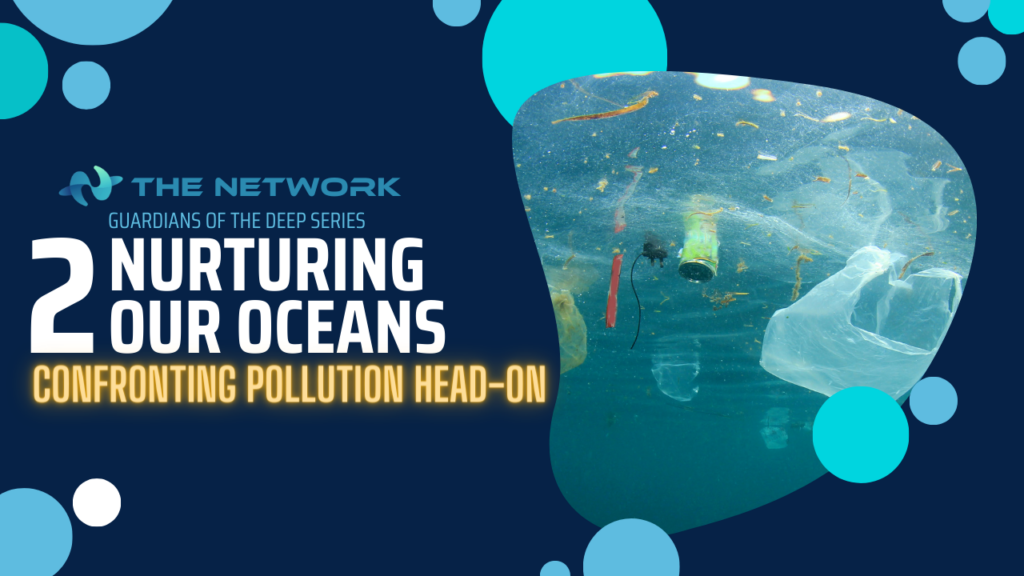Nurturing Our Oceans – Confronting Pollution Head-On

The Earth’s oceans, covering more than 70% of the planet’s surface, are vital to the health of our planet. Unfortunately, human activities have taken a toll on these vast bodies of water, leading to severe pollution that jeopardizes marine ecosystems. In this comprehensive blog post, we will delve into various aspects of ocean pollution, focusing on the plastic pandemic, chemical runoff, oil spills, disruptive oceanic soundscapes, and the microscopic menace of microplastics. Additionally, we’ll provide practical insights for educators, parents, and students to foster a deeper understanding of the issue and contribute to the conservation of our oceans.
Plastic Pandemic: Tackling the Menace of Ocean Plastic Pollution
Plastic pollution has become a global crisis, with our oceans bearing the brunt of this environmental challenge. From single-use plastics to discarded fishing gear, our seas are inundated with plastic waste. This not only poses a threat to marine life but also has far-reaching consequences for human health, given the intricate connections between marine ecosystems and our food supply.
To confront the plastic pandemic, there is a need for a multi-faceted approach. Governments, industries, and individuals must work together to reduce plastic production, improve waste management systems, and promote sustainable alternatives. Initiatives like beach cleanups and plastic-free campaigns play a crucial role in raising awareness and actively combating the issue.
Chemical Runoff and Ocean Health: Curbing the Threat
Chemical runoff from agricultural activities, industrial processes, and urban areas is a major contributor to ocean pollution. These pollutants, including pesticides and fertilizers, make their way into water bodies, leading to detrimental effects on marine life and ecosystems.
To curb the threat of chemical runoff, sustainable agricultural practices, responsible waste disposal, and the implementation of green infrastructure are essential. Educating communities about the impact of their daily activities on water quality is crucial in fostering a sense of responsibility towards protecting our oceans.
Oil Spills and Marine Life: Assessing Long-Term Impact and Solutions
Oil spills pose catastrophic threats to marine ecosystems, causing immediate harm to marine life and long-term damage to habitats. From coating birds and marine mammals to disrupting the food chain, the impact of oil spills is profound.
Preventing oil spills requires stringent regulations on oil exploration and transportation, along with the development and implementation of advanced cleanup technologies. Moreover, fostering a transition to renewable energy sources can significantly reduce our reliance on oil, mitigating the risks associated with spills.
Human Activities Disrupting Oceanic Soundscapes: A Silent Crisis
Underwater noise pollution from human activities such as shipping, drilling, and naval exercises is disrupting the delicate balance of oceanic soundscapes. Marine animals rely on sound for communication, navigation, and locating prey, making this pollution a severe threat to their survival.
Addressing this issue involves implementing quieter technologies in maritime activities, establishing marine protected areas where noise is minimized, and raising awareness about the importance of preserving the acoustic environment of our oceans.
Microplastics Causing Macroscopic Damage: Impact on Sea and Ocean Life
Microplastics, tiny particles resulting from the breakdown of larger plastic items, have permeated even the remotest corners of our oceans. These minuscule pollutants are ingested by marine life, accumulating in their bodies and eventually entering the human food chain through seafood consumption.
To combat the pervasive issue of microplastics, reducing plastic use, improving waste management, and developing innovative solutions for plastic removal from water bodies are imperative. Additionally, fostering a culture of responsible consumption can significantly contribute to minimizing the release of microplastics into the environment.
School or Homeschool Learning Ideas
- Ocean Clean-up Simulation: Engage students in a hands-on simulation where they can understand the challenges and solutions associated with ocean cleanup. This could involve designing models to collect floating debris or organizing a virtual beach cleanup activity.
- Water Quality Testing: Conduct a water quality testing experiment to demonstrate the impact of pollutants on marine ecosystems. Students can collect samples from local water bodies, analyze them, and discuss the implications of their findings.
- Art from Trash: Encourage students to create artwork using recycled materials, emphasizing the importance of repurposing waste. This activity not only fosters creativity but also reinforces the message of reducing, reusing, and recycling.
- Role Play – Eco-Friendly Practices: Organize a role-playing session where students take on different roles, such as government officials, industry leaders, or environmental activists, to discuss and find solutions to ocean pollution.
- Virtual Marine Biology Expedition: Take students on a virtual marine biology expedition, exploring diverse ecosystems and discussing the impact of pollution. Utilize online resources and documentaries to provide a captivating learning experience.
What Our Children Need to Know
- The Journey of a Plastic Bottle: Illustrate the life cycle of a plastic bottle, from production to disposal, emphasizing the environmental impact at each stage. This helps children understand the consequences of their choices.
- Water Conservation Challenge: Challenge children to devise creative ways to conserve water in their homes and communities. This hands-on experience instills a sense of responsibility towards preserving water resources.
- Upcycling Project: Encourage children to embark on an upcycling project, transforming discarded items into useful or artistic creations. This activity not only promotes sustainability but also highlights the potential beauty in repurposing materials.
- Storytelling for Change: Task children with creating short stories or cartoons that highlight the importance of ocean conservation. This not only enhances their storytelling skills but also encourages them to communicate complex issues effectively.
- Family Eco-Pledge: Encourage children to initiate an eco-pledge within their families, setting goals for reducing single-use plastics, conserving energy, and adopting sustainable practices. This instills a sense of collective responsibility and empowers them to be agents of change.
The Big Questions
- What role does individual responsibility play in combating ocean pollution?
- How can technology be harnessed to address the challenges of plastic pollution in our oceans?
- Should there be stricter regulations on industries to prevent chemical runoff into water bodies?
- How can communities work together to raise awareness about the impact of oil spills and advocate for cleaner energy alternatives?
- What innovative solutions can be implemented to reduce underwater noise pollution and safeguard marine life?
Conclusion
Nurturing our oceans demands collective action and a profound shift in our relationship with the environment. From plastic pollution to chemical runoff, each aspect requires a concerted effort from individuals, communities, and governments to safeguard the health of our oceans. By incorporating sustainable practices into our daily lives, educating the younger generation, and advocating for systemic change, we can pave the way for a healthier, more resilient marine ecosystem.





Responses